KULANU







View our most up-to-date calendar on the IHC website at ihcindy org
*Events and programs for Purim 5783 are listed on page 4.
If you love to knit, crochet, sew or embroider and love to schmooze while you stitch, then Mitzvah Stitchers is perfect for you. In the last 5 months, our Stitchers donated more than 200 items for groups needing things like hats and scarves to stay warm. Starting in April, the group will meet online and at Hoverwood Living on the 4th Sunday of the month. Email Barb Levy (bclmom@aol.com) to get added to the email distribution list to receive the Zoom link.
March 5, 12, 19, 26 April 16, 23, 30
Mah Jongg Mavens
Grab your tile set and play a game or ten with the other IHC mahjong mavens. This addicting game of skill, strategy, and luck is a great way to spend an afternoon with other IHC enthusiasts.
March 3 & 17 at 2:30pm
March 10 & 24 at 10:00am
IHC Music Presents: Opera Unstuffed!
March 26 at 4:00pm
Come hear a hilarious take on opera classics featuring graduate students from Indiana University’s Jacobs School of Music. All can attend this free performance at IHC.
Tot Shabbat Friday, April 14 at 5:30pm
For our younger friends, an interactive familyfriendly service with themed activities to take home.
IHC Music Presents: A Cello Recital with Polina Umansky Saturday, April 29 at 4:00pm
You have heard her perform during IHC’s High Holy Days services for Kol Nidre. In this IHC Music recital, hear even more beautiful music from cellist Polina Umansky. This IHC Music concert is free and open to all.
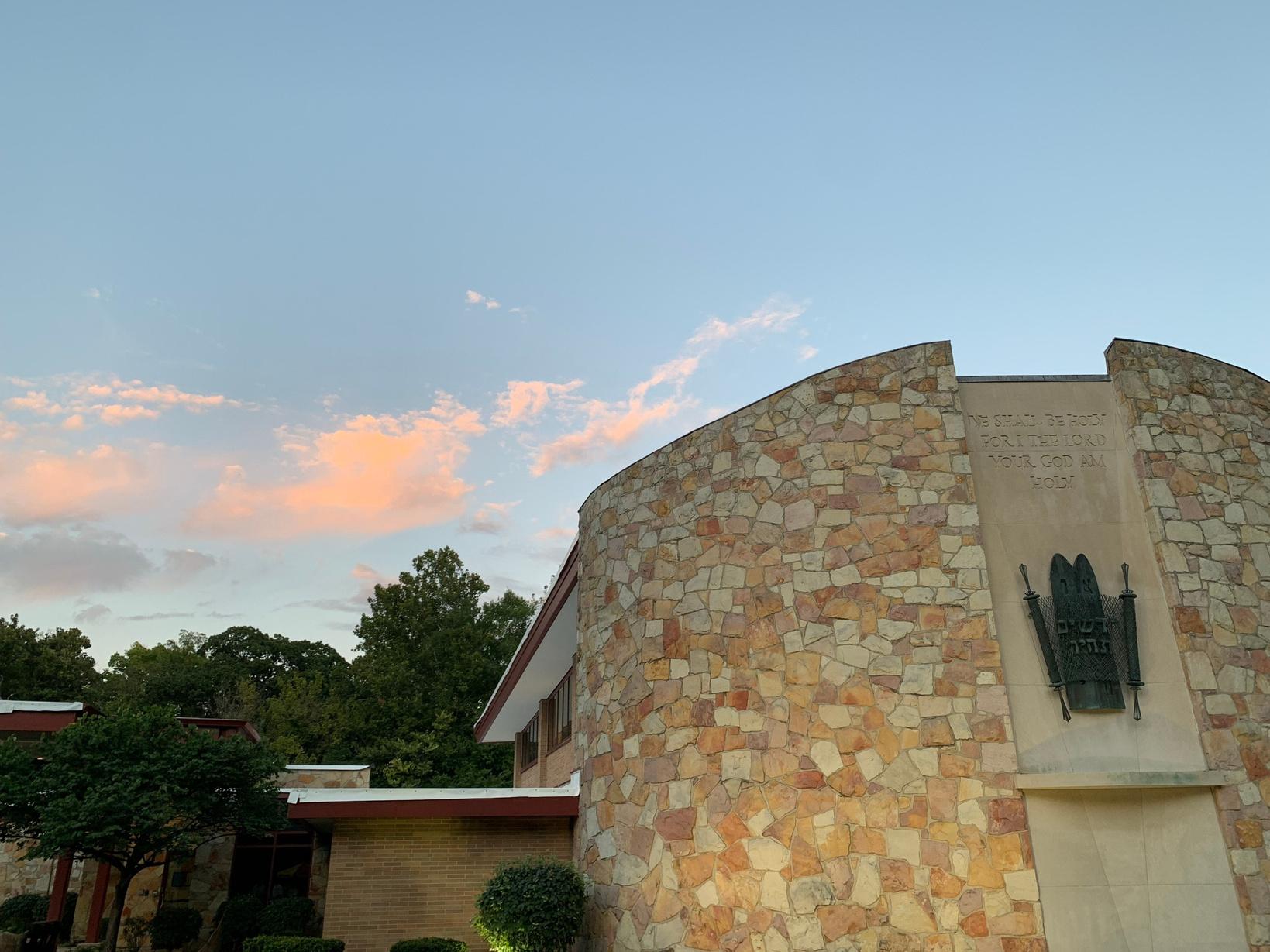
Thursdays, 7:00-8:30pm
Depending on where you look, Jewish tradition offers high praises and utter belittlement of women. How are we to understand the wide range of commentary? Join us for this exploration and discussion - all leading us to consider the role of women then and now.
Co-sponsored by IHC Sisterhood.
Mar. 16, 23, & 30
Tuesdays, 7:00-8:30pm
This course will explore the most up-to-date information from a variety of sources regarding the dynamics of the peace process between Israel, the Palestinian people, and other countries in the region. No prior knowledge necessary.
Apr. 25, May 2 & 9
Hiddur Mitzvah: Beautifying the Mitzvah
Sunday, April 30 from 3:00-6:00pm
Tallit/tzitzit design
Hiddur Mitzvah is the principle of enhancing the mitzvot (commandments) handed down to us. We will explore the mitzvah and customs surrounding each of the ritual items and then use our creativity, along with guidance from experts, to make our tallit. Please register for this class by April 1. Members pay $30 supply fee, $48 for guests.
All classes are included with IHC membership. If you are not yet a member, see the guest fee on the class listing. You can view the full list of classes at ihcindy.org/learn.
To register for all non-weekly classes, contact our assistant to the Office of Lifelong Learning
Beth Meade-Hession at bethmh@ihcindy.org or call her at 317-255-6647.
Maxwell Pendlum, who will be called to the Torah on March 18, 2023. He is a seventh grade student at Riverside Junior High. Maxwell enjoys cooking/baking, he performed in the school's fall musical, and is in yearbook club. He is also a straight A student. His parents are Matt and Tracey Pendlum. He has an older sister- Adrea.
Isaac Price, who will be called to the Torah on April 15, 2023. He is a seventh grade student at Eastwood Middle School. Isaac enjoys playing lacrosse and football. He enjoys practicing bass guitar. His parents are Jeremy and Marci Price.
Elliott Fingerhut, who will be called to the Torah on April 22, 2023. He is a seventh grade student at Creekside Middle School. Elliott loves to play hockey with the Indianapolis Youth Hockey League. He runs track and has played middle school football. He also loves travel, drawing and spending time with friends and family. Elliott's parents are Rachel and David Fingerhut. He has a twin brother, Holden, and two older sisters, Lilia and Aleni.
Holden Fingerhut, who will be called to the Torah on April 22, 2023. He is a seventh grade student at Creekside Middle School. Holden loves to participate and compete nationally in dance at Expressenz Dance Center. He is an avid chess player, loves to solve Rubik's Cubes, enjoys traveling and spending time with his friends and family. He has also been on the Principal's High Honor Roll. Holden's parents are Rachel and David Fingerhut. He has a twin brother, Elliot, and two older sisters, Lilia and Aleni.
Meyer Goldsmith, who will be called to the Torah on April 29, 2023. He is a seventh grade student at Northview Middle School. Meyer has played soccer for many years and, recently, started volleyball. He enjoys playing euphonium in band and loves geography, escape rooms, games, and the family dogBuck. He is a high honor roll student. His parents are Eric Goldsmith and Jennifer Boehm. He has an older sister- Reed.
New members:
Jayme & Stuart Donnelson
Laura & Mike Dreyfuss
David & Linda Gotthelf
Anastasia Renfro
Frank Swiss
Crystal & Ashley Wade
Megan Zurawicz ~
The Kroot Family (Martin & Natalie, Greg & Caroline, Barry & Jane) who were honored by the Jewish Federation of Greater Indianapolis as the 2022 Or L'Dor Recipients.
Barb Levy, recipient of JFGI's Kehilla Award for Outstanding Leadership.
Barbara Leventhal, winner of the KipnisWilson/Friedland award at the International Lion of the Judah conference.
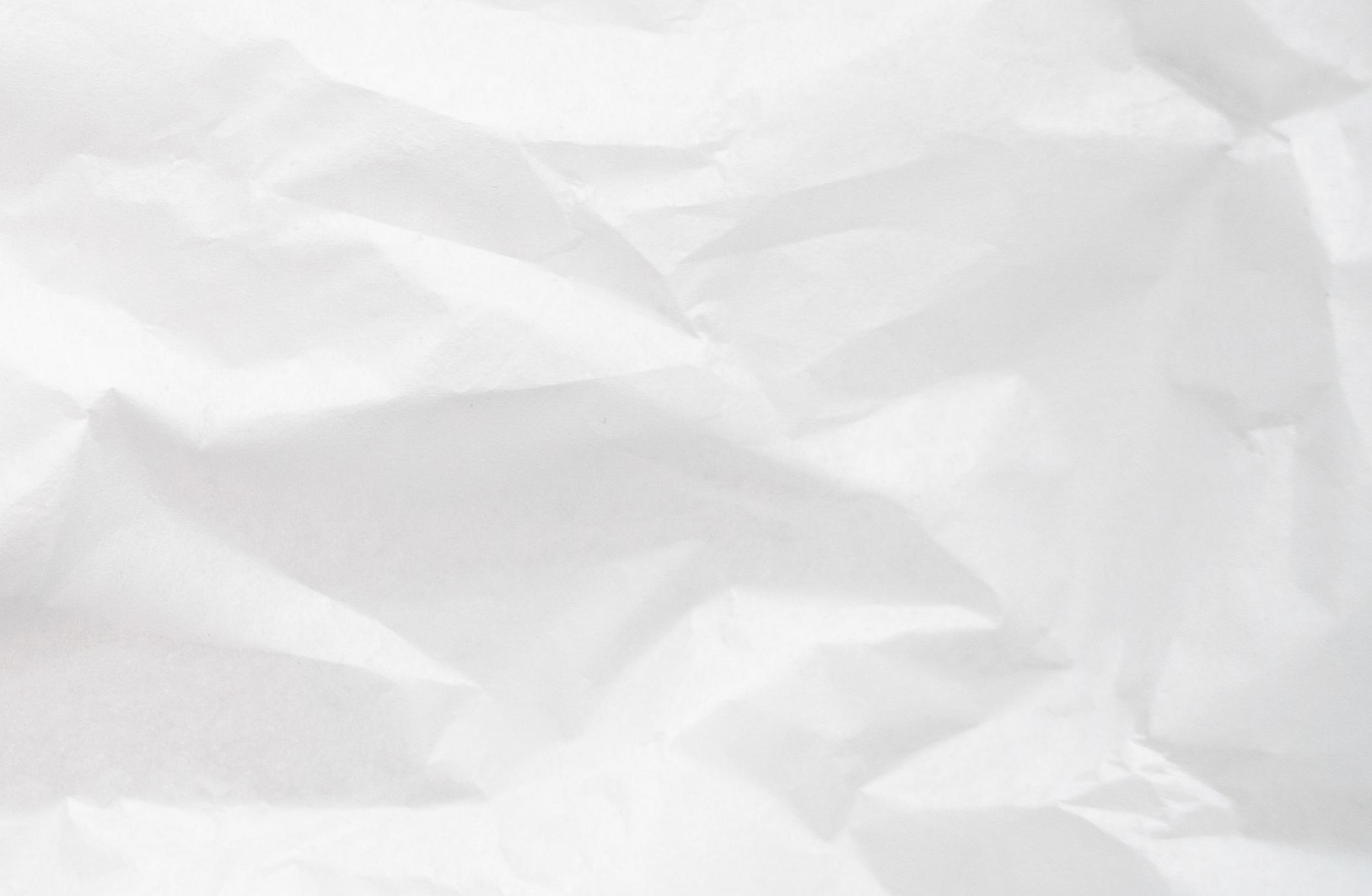
The family of Martha Brindle z''l
Betsy (Jim) Backe, sister and brother-in-law of Jerome Steele z''l
Carolyn & Harold Hiser, family of Pearl Wides Roth z''l
The best efforts were taken to create these listings since the last issue of the Kulanu. Please reach out to communications@ihcindy.org if you believe there was an omission or error
According to the sages, whoever enters the Hebrew month of Adar, does so with joy and gladness.
Our first thought might be to connect with a sense of elation with the coming of spring and changes in the weather. The rabbis were keenly aware of the effects of the winter months on the human spirit. Today, as we prepare for the spring to wrap us in its warm embrace, the rabbis also encourage joy and gladness by looking with anticipation towards not one, but two great Jewish holidays – Purim and Passover. Purim involves the more recent events of the Book of Esther and Haman’s political plot to destroy the Jews; Passover commemorates the ancient biblical events of Egyptian slavery and the Exodus. These two events form powerful bookmarks to frame our understanding of modern antisemitism.
Perhaps rather than, “whoever enters Adar does so with joy,” we should read, “whoever realizes they are entering Adar, should be filled with joy to do so!” In other words, the month itself cannot transform us, and pull us from our seasonal affective conditions. But, there is so much within this month that might do just that.
These two holidays remind us that we are captains of our own destiny, and that we must meet God’s miracles with our own ingenuity and commitment. Think of the commentary that suggests that while the children of Israel were crossing the Sea, two brothers noticed only the mud beneath their feet. By never looking up, they assumed they were still in Egypt, pressing the mud to make more bricks for Pharaoh. To see the miracle, you’ve got to look for it. The mud at our feet is sometimes difficult to see past. It take intention and will to look up and see.
Our continued survival is more than enough reason to celebrate, especially as we witness a rise in antisemitic events to levels not seen since the Second World War. But there is another underlying reason for celebrating, one that truly allows all of us to enter the month of Adar (which began February 22) with joy.
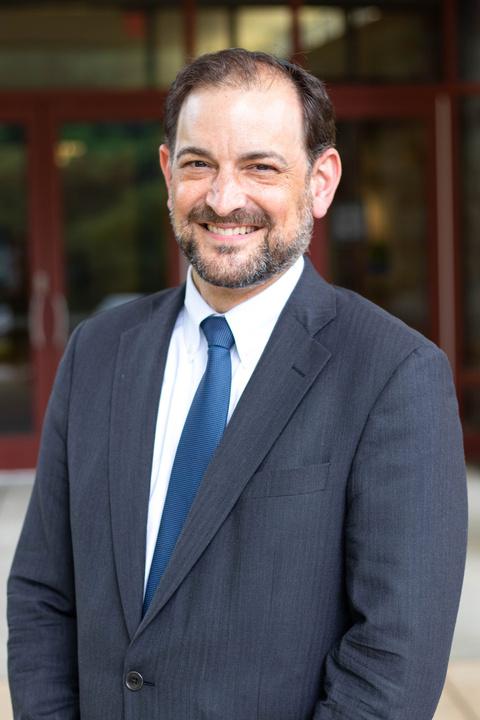
Joy, after all, is not exactly something we can feel on command. The sages teach that perhaps we are translating this passage incorrectly.
Many of us enter Adar looking forward to IHC’s Purim offerings: our amazing carnival and shpiel, or our latest “adults only” Purim spectacular; or our Passover offerings: a new social justice Passover Seder, or simply the chance to create your own seder with family and friends. Any or all of these celebrations intentionally bring with them the joy of Adar. Pause today to notice the change in the air, the new blossoms on trees, and the sign of the miracles all around us. All that it takes to experience the joy and gladness of Adar is to look intentionally, and to see with intentionality.
Hamantaschen Sip & Bake
Thursday, March 2 from 6:30-8:30pm
Calling all bakers, experienced or not, to join us in the IHC Kitchen to prepare and taste test some savory hamantaschen in preparation for our IHC's adult Purim shpiel. Sips and snacks will be provided.
Family Purim 5783 at IHC
Sunday, March 5
9:30am: Jewish Learning Program
10:30am: Purim Shpiel
A Minions’ Purim: The Rise of Jew
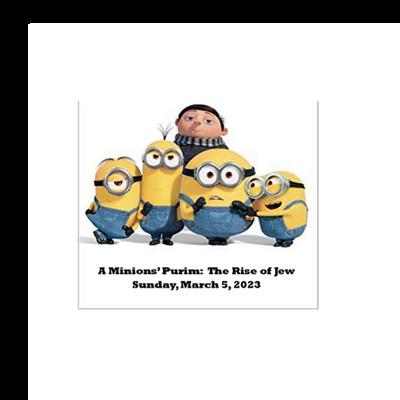
11:00am-12:30pm: Purim Carnival
Open to the community, please note that tickets must be purchased
Adult Purim Shpiel- Down
Monday, March 6 from 7:00-9:00pm
Those 21+ are invited to join us “Down the Rabbit Hole” for Purim Come see the story of Purim told through the Looking Glass of Alice in Wonderland. Costumes are encouraged, but not required.
Attendees are encouraged to fulfill the commandment on Purim to give Matanot LaEvyonim (gifts to the poor). Please bring a bag of canned or boxed food for Popsie’s Pantry to support IHC’s focus on food insecurity You can also make a monetary donation at the event with a check or cash.
Did you order hamantaschen?
Don't forget to pick them up on:
Sunday, February 26 from 9:30am-12:00pm OR
Sunday, March 5 from 9:30am-12:00pm
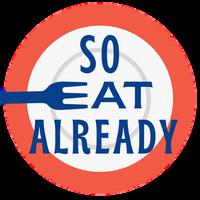
One of the mitzvot of Passover is refraining from eating foods with leavening agents However, for centuries, many Jews (primarily Ashkenazi Jews) also refrained from eating foods like legumes, seeds, corn, and rice But, for those who practice the eating of kitniyot, primarily Sephardic Jews, all those foods are allowed during Passover We hope you will enjoy the two Sephardic Passover recipes below: one with kitniyot and one without
Growing up, my family always enjoyed a tapestry of flavors at Passover. Whether it was a Sephardi-style charoset with nuts and spices, or traditional matzah ball soup, my mother saw the holiday as a chance to showcase our Indian Judaism Perhaps my favorite memory is eating chicken curry and rice as a Passover meal, especially since my father enjoyed pointing out why it was OK for us to eat rice on the holiday! I asked my mother to share her famous chicken curry recipe with you all, so here it is below. Enjoy and Chag Pesach Sameach!
~Cantor Aviva Marer
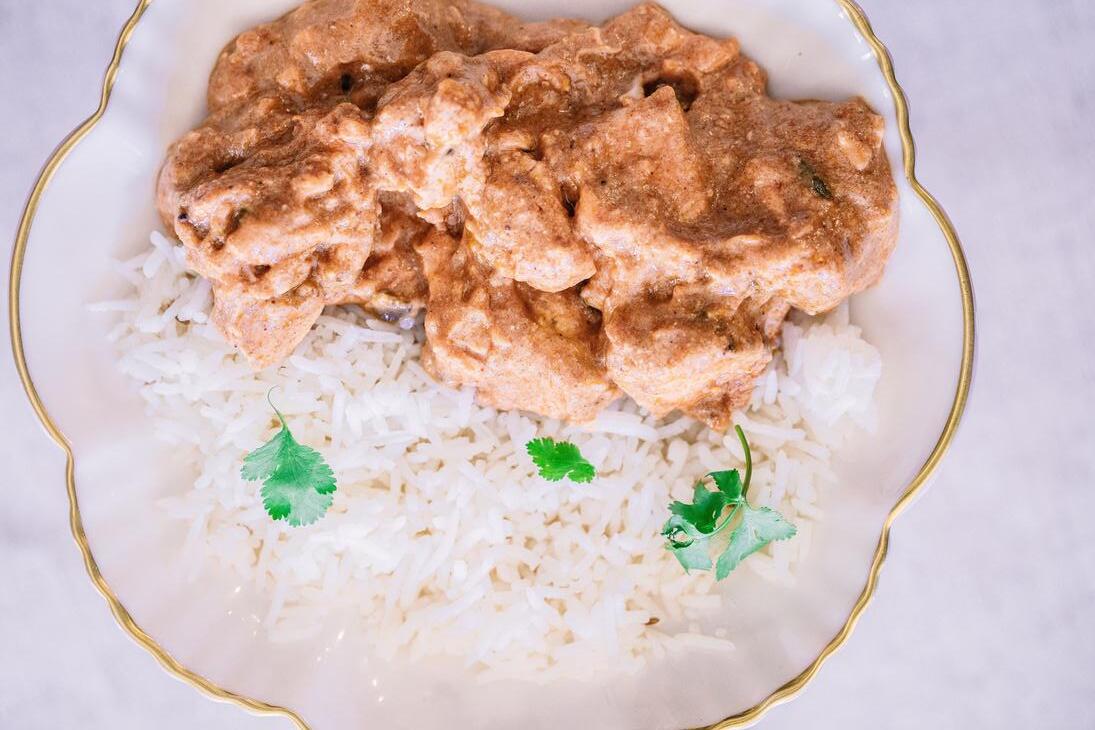
Ingredients:
8chickenthighsonoroffthe bone,skinremoved
500gcannedtomatoes
1small(1-2inch)pieceroot ginger,peeledandroughlychopped
4clovesgarlic,peeled
2largeonions
2tspgarammasala
1tsphotchillipowder(moredepending onhowspicyyoulikeyourcurry)
1tspgroundcumin
1tspgroundcoriander
1tspcinnamon
1/2tspturmeric
Saltandpepper
2tbspvegetableoil
Choppedcoriandertogarnish(optional)
Basmatirice
Peel and chop the onions and fry with the vegetable oil in a deep saucepan or casserole until well browned but not burnt.
Spoon onions and oil into a blender. Add the tinned tomatoes, the garlic and ginger and blend until smooth. Note: this stage can also be done in the saucepan with a hand-blender, but beware splattering! Return contents of blender to saucepan. Add the spices, season with salt and pepper and bring to boil. Add the chicken pieces and simmer for 45 minutes or until chicken is cooked through. If the mixture is too thick during cooking, mix with a little water.
Serve with basmati rice and garnish with the coriander if desired.
The following paragraph and recipe are used with permission from www reformjudaism org
Recipes for matzah lasagna or matzah pies are common in American Jewish cookbooks, but these foods are not inventions of the American Jewish kitchen. Throughout the Mediterranean, Turkish Minas, Italian Scacchi, and Greek Pitas – all layered dishes similar to lasagna –have been prepared for at least a thousand years using matzah for dough during Passover. This recipe is a variation of the classic Turkish Mina and a meatless Scacchi.
Ingredients:
Spinach Filling
2 tablespoons butter
1 medium onion, finely diced
1 10-ounce package of frozen chopped spinach, defrosted
1/2 pound feta cheese, crumbled
7 1/2 ounces Friendship farmer cheese
2 eggs, lightly beaten
Salt and freshly ground pepper to taste
1/4-1/2 teaspoon nutmeg, to taste
1 Tablespoon minced fresh dill
Mushroom-Artichoke Filling
2 tablespoons unsalted butter
1 large clove of garlic, finely minced
8 ounces sliced mushrooms
8 ounces defrosted artichoke hearts
Salt and freshly ground black pepper
2 tablespoons roasted pine nuts
8 regular matzah squares
2 cups warm vegetable or mushroom broth
1 egg
2 tablespoons grated Parmesan cheese
Additional butter for greasing the pan
First seder: April 5
Passover ends: April 12
Preheat oven to 350°F
Lightly grease a 13"x 9" pan with the additional butter Set aside
Melt 2 TB of butter in a 2 qt pan. Sauté the onion until golden.
Squeeze out excess moisture from spinach and add to onions. Cook over low heat, stirring occasionally, until most of the moisture has evaporated. Mix in the feta, farmer cheese, eggs, seasonings, and dill Set aside
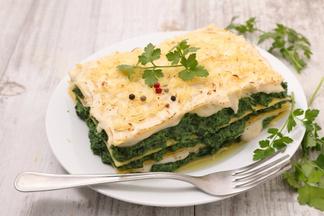
Melt the remaining 2 TB of butter in a small sauté pan and add garlic Cook for 20 seconds over medium high heat, and then mix in the mushrooms, sautéing for about 5 minutes.
If the artichoke pieces are large, cut in half. Add to mushroom mixture and stir to heat through. Mix in the toasted pine nuts and season with salt and pepper Set aside
Heat the 2 cups of broth in the microwave for about 1 1/2 minutes
Pour into an 8-in square casserole or a deep dish that will hold the liquid and soak 2 sheets of matzah at a time until they are soft and pliable. Once you have 4 soft matzot, fit them into the bottom and sides of the buttered dish.
Spread the spinach mixture over the matzot, then top with mushroom mixture
Soak remaining 4 sheets of matzah in the broth and then cover the filling, trimming or tucking in the sides. Add the remaining egg to leftover broth in the dish (note: if no broth is left, combine 1/2 cup broth with the egg) and pour it evenly over the entire casserole
Sprinkle parmesan cheese over the top and bake for 35-45 minutes until golden brown and bubbling Serve hot or at room temperature.
The traditional Passover seder plate includes the following items (pictured right top), which represent specific parts of the Exodus story:
Beitzah: The roasted egg is symbolic of the festival sacrifice made in biblical times. It is also a symbol of spring - the season in which Passover is always celebrated.
Chazeret: Lettuce is often used in addition to the maror as a bitter herb. The authorities are divided on the requirement of chazeret, so not all communities use it. Since the commandment (in Numbers 9:11) to eat the paschal lamb "with unleavened bread and bitter herbs" uses the plural ("bitter herbs") most seder plates have a place for chazeret.
Zeroa: The shank bone is symbolic of the Paschal lamb offered as the Passover sacrifice in biblical times. Vegetarian and vegan households may use a roasted beet as a substitute.
Charoset: This mixture (often apple, nuts, and spices ground together and mixed with wine) are symbolic of the mortar used by Hebrew slaves to build Egyptian structures. There are several variations in the recipe for charoset; the Mishnah describes a mixture of fruits, nuts, and vinegar.
Karpas: Parsley is dipped into salt water during the seder. The salt water serves as a reminder of the tears shed during Egyptian slavery. The dipping of a vegetable as an appetizer is said to reflect the influence of Greek culture.
Maror: Bitter Herbs (usually horseradish) symbolize the bitterness of Egyptian slavery. The maror is often dipped in charoset to reduce its sharpness. Maror is used in the seder because of the commandment (in Numbers 9:11) to eat the paschal lamb "with unleavened bread and bitter herbs".
In recent years, many families are choosing to add other meaningful items to their Passover seder plate, many connecting with larger themes of social justice. Here are some examples (pictured right bottom) you might consider including this year:
A. Sunflower Seeds: The sunflower is the national flower of Ukraine. Sunflower seeds are added as a symbol of resistance to Russian invasion.
B. Tomato: The tomato represents migrant workers who are vastly underpaid (if paid at all) and required to be away from their families for months on end in order to make a living.
C. Orange: The orange represents the fruitfulness that is added when those under the LGBTQIA+ umbrella are fully included in our community.

D. Olives: The olive is representative of the olive branch. The olive branch is a wellknown symbol of peace and is used to display our prayer for peace in the Middle East.
E. Fairtrade Chocolate of Coffee: This is included to remind us of child slavery that still exists around the world and in many of the companies we use every day.
F. Artichoke: Like the artichoke, which has thistles protecting its heart, the Jewish people have been thorny about the question of interfaith marriage. The artichoke stands for the wisdom of God's creation in making the Jewish people a population able to absorb many elements and cultures throughout the centuries--yet still remain Jewish.
You can find other examples of modern food items for Passover on www.reformjudiasm.org and haggadot.com.
1. 2. 3. 4. 5. 6.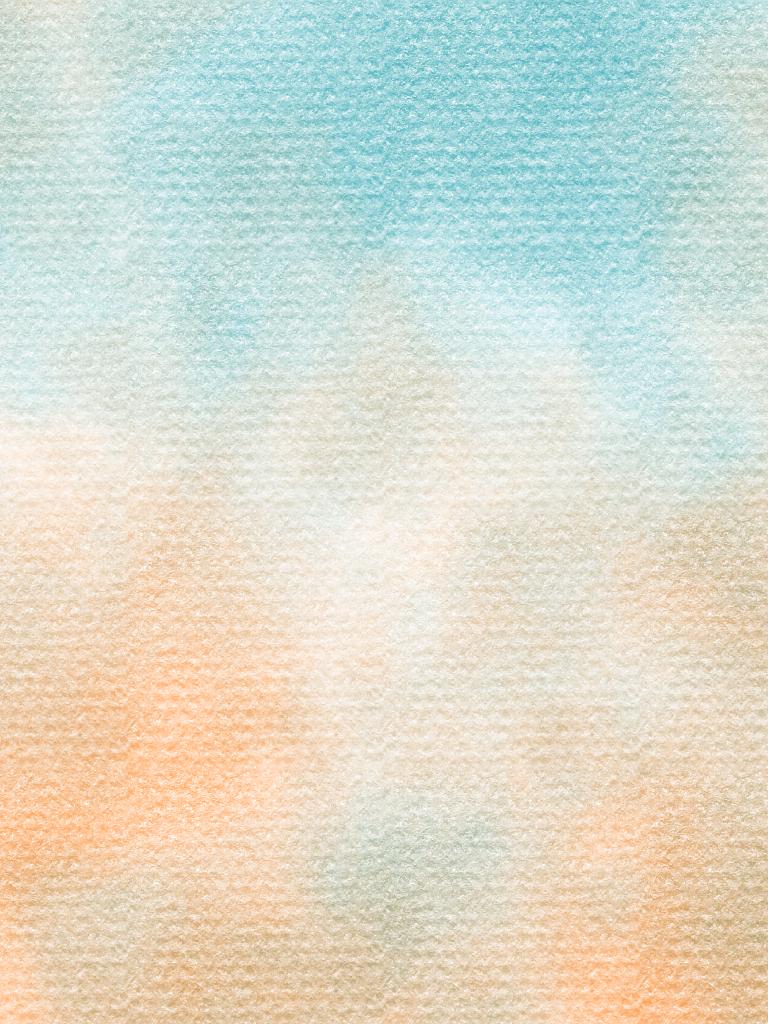
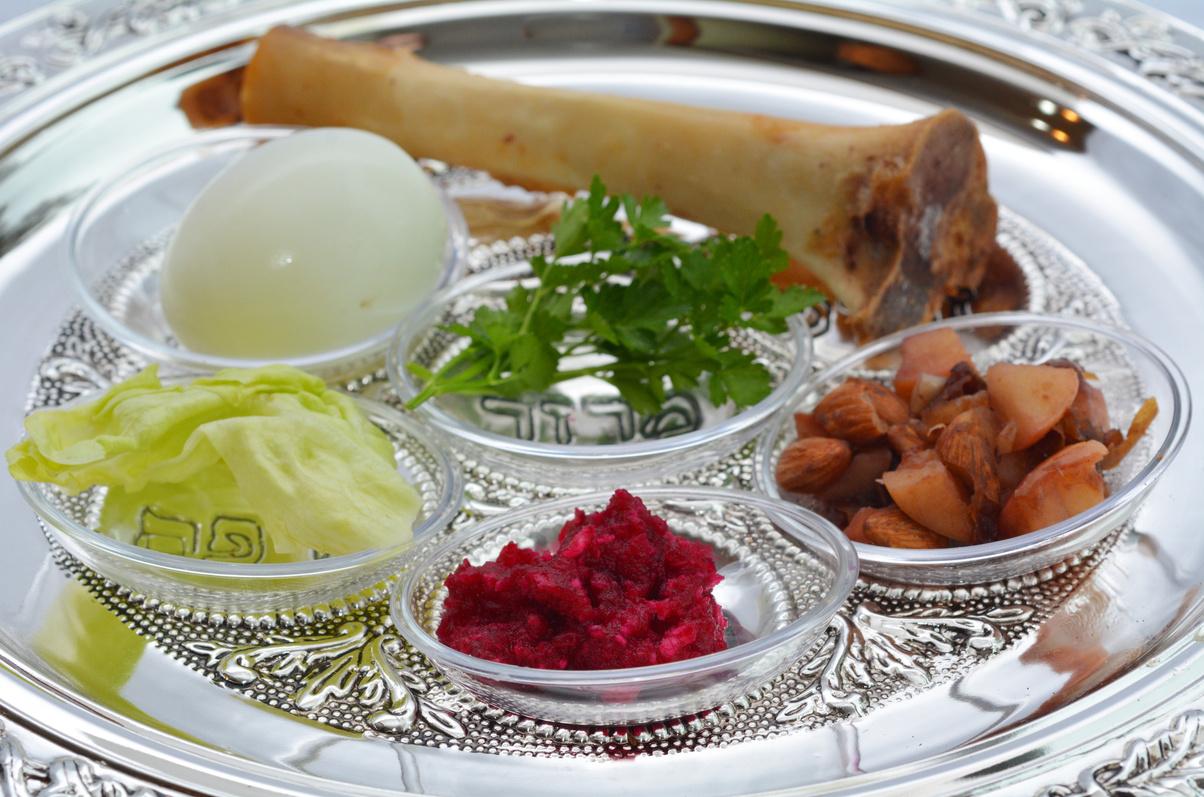
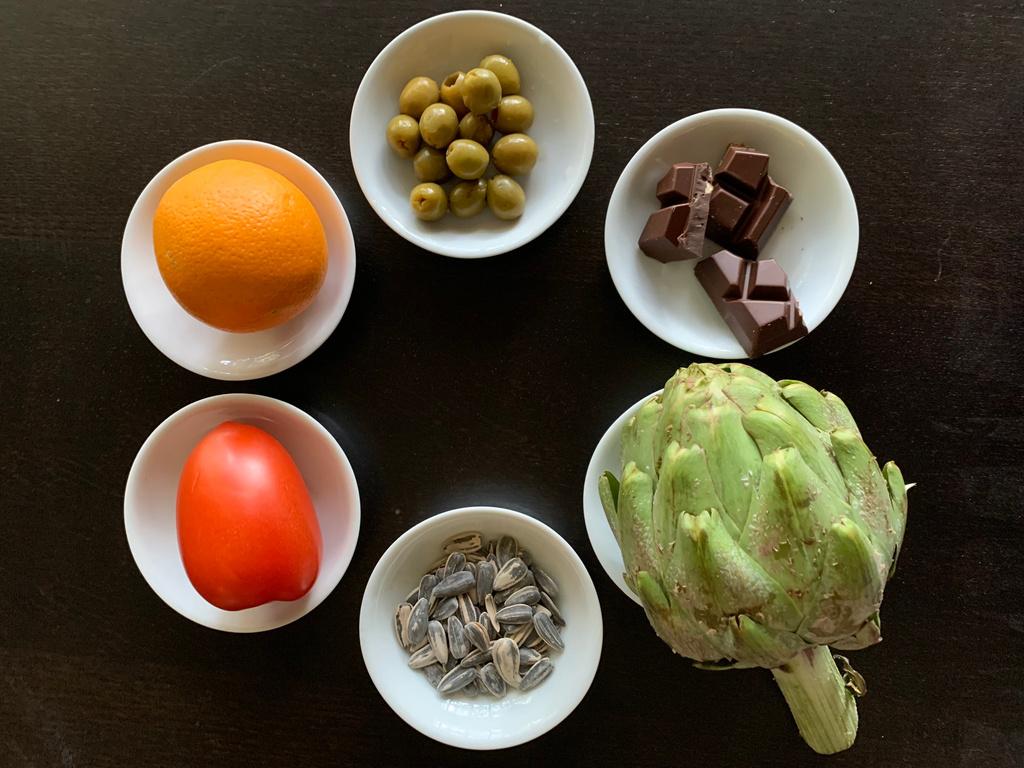
Tzedek, Tzedek, Tirdof - Justice, justice, shall you pursue! This is the rallying cry for generations of Jews, and especially Reform Jews who express their faith through social action. At IHC, there is a new committee charged with coordinating and focusing that energy - the Tzedek Committee.
Established in 2022, the Tzedek Committee is chaired by Sarah Freeman and includes representatives from the following organizations: Adamah, Brit Olam, Brotherhood, Caring Community, Family Promise, Mitzvah Stitchers, and Sisterhood The Tzedek Committee works with clergy and lay leadership to identify and recommends to the Board of Directors social justice goals for the IHC community; enhance communication related to social justice between and among IHC groups, lay leadership, staff, and clergy; and facilitate the delivery of resources to support congregants and groups as they achieve individual and shared social justice goals
With the endorsement of the IHC Board, the Tzedek Committee has identified food insecurity as the focus of IHC’s social justice programming and advocacy for 2023
The USDA defines food insecurity as a lack of consistent access to enough food for every person in a household to live an active, healthy life
According to Feeding Indiana’s Hungry, 15% of Hoosiers, including over 335,000 children, are food insecure, with Marion County experiencing the highest level of food insecurity at 19 4%
IHC boasts a strong tradition of designing and supporting initiatives to mitigate hunger in our community For example, the Sisterhood Social Action Committee members have, for many years, worked together to make sure that students at Greenbriar Elementary School, and their families, have extra food to eat during school breaks and for holidays And thanks to generous donations made to IHC’s Hunger Fund throughout the COVID-19 pandemic, disbursements totaling over $10,000 were made to 16 different organizations working to fight food insecurity - all in addition to IHC’s continued support of Gleaners and Second Helpings
Sarah Freeman, Tzedek Commitee Chairof those who are food of those who are food of those who are food insecure are children insecure are children insecure are children
The Tzedek Committee will support these ongoing efforts and work with the entire congregation to find new ways to address food insecurity in our city by facilitating coordination and communication among congregants, committees, IHC leadership, and clergy IHC committees and their members will continue to develop and implement the diverse social action and social justice efforts as they always have done For example, Brit Olam will continue to advocate for systemic change that will help our fellow Hoosiers succeed and flourish, while the Mitzvah Stitchers will craft the blankets and hats that keep our youngest and oldest residents comfortable and warm
As IHC charts its 2023 social justice course, the Tzedek Committee continues to brainstorm how IHC can work together to repair the world and make Indianapolis and its citizens more food secure Ongoing discussions include ideas such as a congregational Mitzvah Day, and food/donation drives centered around the High Holy Days
The Tzedek Committee would love to hear from you, specifically, what do you want to learn about food insecurity? What kind of programs would you like to participate in? What organizations should IHC support?
Please send your ideas to tzedek@ihcindy.org and stay tuned for exciting new developments!
of Hoosiers of Hoosiers of Hoosiers are food are food are food iinsecure insecure nsecure
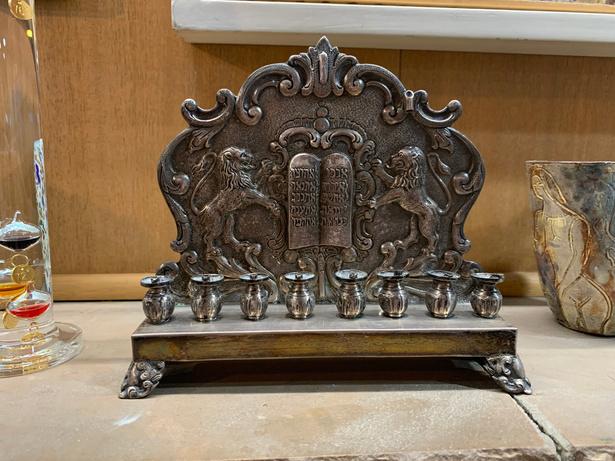
Dorit Paul was born and raised in Mannheim, Germany. The earliest years of her childhood coincided with the rise of the Nazi Party, Adolf Hitler, and the party’s extreme antisemitic views. Since she was so young, Dorit does not remember much of her time in Germany, but she does recall seeing a parade as she sat in the windowsill of her parents’ apartment. She remembers, “a big parade, which I thought was a great parade, and my parents were very upset, but I didn’t understand why”.
She was eight years old.
Dorit later learned that what she witnessed that day was in fact Hitler’s occupation and remilitarization of the Rhineland in 1936.
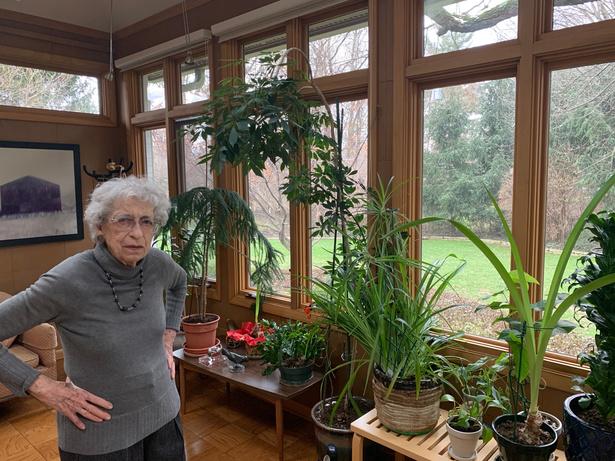
Dorit says it was not a matter of if her family would flee Germany; it was a matter of when. Her grandmother came over to her parents, warning them the Gestapo was in town. Her parents left quickly, taking the next train to Switzerland, with Dorit leaving the next morning. The family spent some time in Switzerland, before eventually immigrating to the United States, where her mother was already a citizen.
Dorit and her family ended up in New York City. Without any formal teaching, she and other refugee children learned English “by a sort of osmosis.” Despite fleeing the Nazis, Dorit learned that antisemitism was not just a German problem. She recalls a hot summer where her family decided to take a trip into the country. Two hotels turned the family away, saying they were full. The third hotel was eager to offer rooms, but the hotel’s brochure read, [Gentile] clientele only since 1938. Her family later found a hotel that accepted Jewish guests. This was Dorit’s introduction to antisemitism in the United States.
In New York City, Dorit got quite the educationgraduating from high school, then getting her college diploma from Radcliffe College When she returned home, she soon met the man who would become her husband, Gerald Paul z''l Much to the dismay of her parents, the couple moved to Indianapolis, Indiana, where Gerald’s family lived Dorit became a member of her husband and inlaws’ temple in the early 1950’s- Indianapolis Hebrew Congregation Dorit believes belonging to a temple is just something one does, like eating Being a part of IHC just made sense: for her, IHC is “an institution that is well worth belonging to and that has stayed true to its mission.”
In her IHC ‘tenure’ Dorit served the temple in a variety of roles She was an active member of Sisterhood She served on a handful of committees; including worship and cemetery committees (the latter of which she currently serves on) Dorit was also part of the search committee that brought IHC its first female clergy member- Cantor Janice Roger She served a full term on the IHC Board of Directors She also dedicated time to the greater Jewish community- leading the Women’s Committee and the Women’s Drive within the Jewish Federation
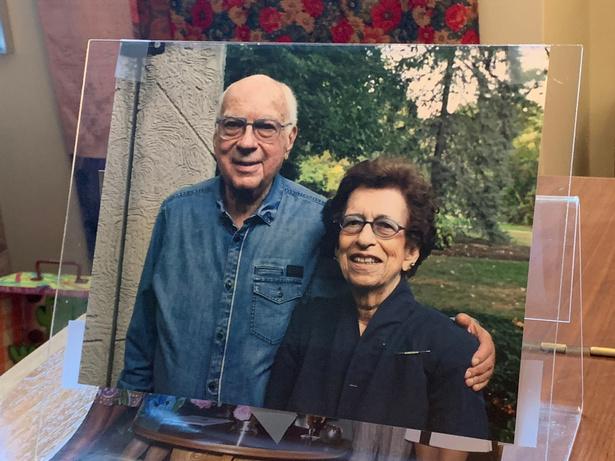 Dorit has her parents' hanukkiah that they brought with them to the United States from Germany. Dorit believes it was likely made in the 19th century.
Dorit pictured with her husband Gerald z''l. The two met in New York City but moved to Indianapolis, where his family lived and belonged to Indianapolis Hebrew Congregation.
Dorit has her parents' hanukkiah that they brought with them to the United States from Germany. Dorit believes it was likely made in the 19th century.
Dorit pictured with her husband Gerald z''l. The two met in New York City but moved to Indianapolis, where his family lived and belonged to Indianapolis Hebrew Congregation.
From her involvement with the opera and symphony to the Eiteljorg Museum and Newfields (formerly the Indianapolis Museum of Art; IMA), it is difficult to find a part of Indianapolis's cultural scene that Dorit has not touched in some way, shape, or form.
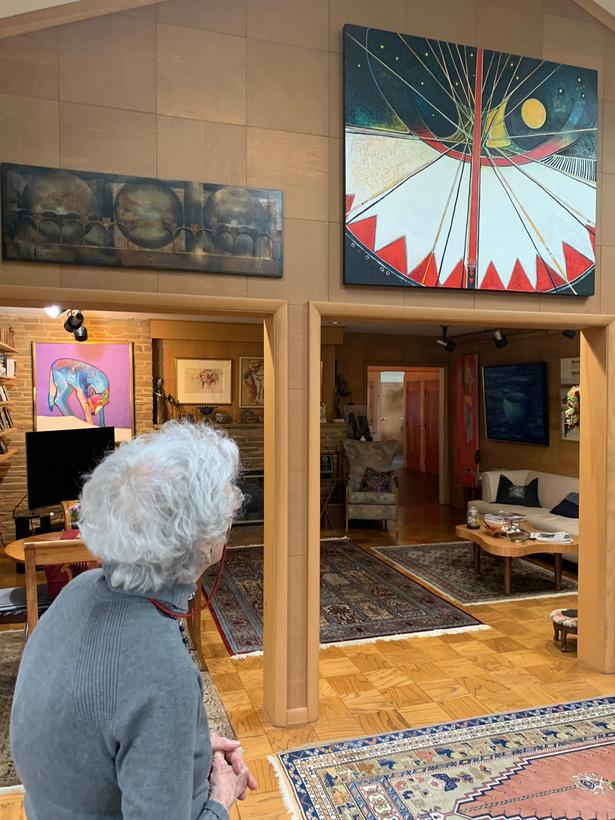
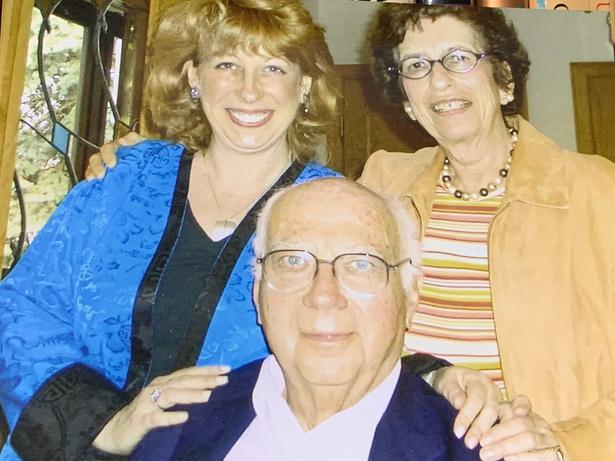
Art, in particular, was always a meaningful part of her life. She and her husband curated quite a collection of their own with pieces as local as Indianapolis and from as far away as China. Both helped IMA acquire new works of art from places like Chicago and New York City. Dorit proudly served as an IMA docent, sharing her passion and knowledge to hundreds of museum guests over the years. Her time volunteering provided many high points, including one instance of the sincerest form of flattery. Dorit recalls, “for some reason I was back in the museum, in the galleries. There was a young kid [from a recent school tour] giving the tour to his parents. It was thrilling to see how he had internalized what I had done, and was continuing it on.”
There has never been a doubt in Dorit’s mind that giving back to her communities, both Jewish and secular, was vital. “I had a great education and I thought it was my duty to do tikkun olam [repair the world], in my own small way”. She also embraces Jewish values that promote being charitable and open mindedness.
At 94 years old, Dorit cannot help but count her blessings; a long life, two daughters including member Eloise Paul and two sons-in-law including member Bill Lee, and a home full of plants and artwork from around the globe. However, she worries deeply for the current and future generations of Jews, for the same reason her family fled Germany all those decades ago- the rise of antisemitism. The latest data from the AntiDefamation League shows there were 2,323 ADL reports of antisemitism in the United States in 2022. Dorit admits the subject leaves her pessimistic about the future. She applauds efforts to stop the hate, but in her words, “you can read history, but you better believe history.”
Even with her deep concerns, she still truly believes that, “kindness and empathy to other people is what would make a better world.”
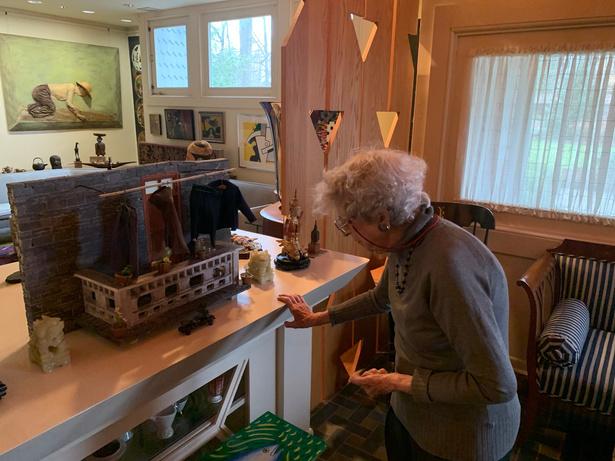 Dorit with her husband Gerald and daughter Eloise
Dorit admires one of the many pieces of artwork in her home. She and her husband collected a wide variety of artwork over the years.
Dorit with her husband Gerald and daughter Eloise
Dorit admires one of the many pieces of artwork in her home. She and her husband collected a wide variety of artwork over the years.
Back in the early 1980s, when I first taught in the religious school, the curriculum included the use of a book on the importance of one. It featured some famous Jewish heroes, such as Golda Meir, and some not as famous, such as Commodore Uriah Levy.
Discovering heroes from one’s heritage can strengthen one’s identity and values, enabling us to become engrossed in history and folklore in a not so subtle way. This concept is still relevant for children and for adults. Sometimes, too, we can find “heroes” in unexpected places and under unexpected circumstances.
Two books that were featured in the library’s programing in January quickly come to mind.
First, You Never Know, by Francine Prose and illustrated by Mark Podwal, was read by Larry Cohen, the library’s storyteller, to the second graders. The story is based on the legend of the “lamed-vavniks.” It is said that in every generation there are 36 holy people, lamed-vavniks, who perform good deeds, but who they are is, and remains, a secret.
Psalm 126, in describing our people’s return to the Promised Land following our Babylonian exile, includes this passage, known as Shir Hamaalot: “A song as ascents. When God brought the exiles back to Zion it was like a dream. Our mouths were filled with laughter and our tongues with song…” I imagine this also describes the scene, in November of 1947, when the news of the United Nations passing of resolution 181 hit the streets in the newly formed Jewish state of Israel.There had been so many concessions, and so much uncertainty, not to mention the very ominous presence of the devastation of European Jewry which hung over every single Jewish household in Israel and the world. No one knew what the future would bring, but crowds of Jewish immigrants poured into the streets with excitement in Tel Aviv and Jerusalem, celebrating the fulfillment of a dream – a modern day miracle.
In truth, the intervening 75 years have been challenging ones for the fledgling Jewish state. Israel continues to wrestle with its identity both as a democracy and a homeland for the Jewish people. They struggle with the role the religious right should play, and with making space at the table for the religious left.
Second, for adults, we started our 2023 book club year discussing One Hundred Saturdays: Stella Levi and the Search for a Lost World, by Michael Frank. Who is Stella? She is a nearly one-hundred-year-old woman, born and raised in the Juderia, the Jewish Quarter, on the island of Rhodes. Stella’s life was totally disrupted by being one of the more than 1,600 Jewish citizens of Rhodes suddenly transported by the Nazis all the way to Auschwitz in 1944 – for no apparent reason other than they were Jewish.How did Stella cope, survive several concentration camps, and lead a productive life? You will have to read the book to find out! Book club members described Stella as being spectacular, amazing, courageous, remarkable, adaptable, intelligent, determined, observant, all factors contributing to her survival. As always, luck played a role, too.
Books to inspire young and adult readers can be found in your Temple Library. Remember to look for Purim and Passover titles in March and April.
Jewish Book Club
March 14 at 12:00pm, The Thread Collectors by Shauna J. Edwards and Alyson Richman
April 11 at 12:00pm, The Deadly Scrolls by Ellen Frankel
Rabbi Brett KrichiverThey struggle with what it means to be a non-Jew in the Jewish state. And, of course, Israel has struggled almost constantly with aggression, terrorism, and war from its neighbors in 1948, 1967, 1973, 1982, 1987, and on and on. And there is the untenable and downright inhuman circumstances of the occupied territories, the Golan Heights, and the Gaza Strip.
We commemorate the significance and resonance of all these issues, even as we marvel at Israel’s accomplishments in the fields of science, technology, agriculture, medicine, and the arts. An, just as our criticism of Israel is important and valid, so should be our pride and gratitude for Israel’s unbelievable success. Jews around the globe are safer, more celebrated for their contributions to society, and more connected to their Judaism as well, all because of Israel’s existence. In honor of this monumental milestone, let us all be as quick to sing Israel’s praises as we are to criticize its policies and politics. And together, we will continue the hard work of pushing Israel to grow into the Jewish democracy we know it can become. ‘Happy Birthday’ to this modern day miracle!
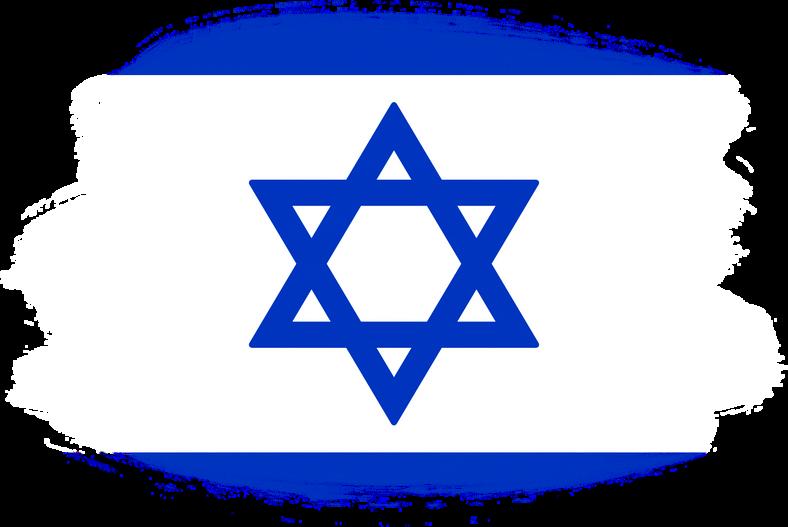
Early Registration for Summer Camp
Now through March 31
May 25:
The last day of the school year
June 5:
The first day of summer camp
If you have any questions regarding ECC summer camp or enrollment for the school year, please reach out to the ECC Director Jodi Kaseff at jodik@ihcindy.org or by calling the ECC directly at 317-254-2186.
It is hard to believe, but it is time to start working on the Rosh Hashanah Retreat at GUCI for 2023/5784. We would love your help to plan this this important day. If you are interested in joining the retreat committee or helping with the retreat, please contact Rabbi Chernow-Reader at JordanaCR@ihcindy.org or call the IHC office at 317-255-6647.
M
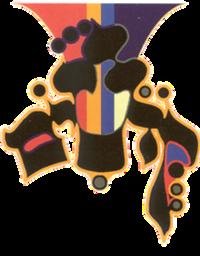
May 21 at 4:00pm
Celebrations: An Indianapolis Children's Choir performance
The ICC’s Master Chorale joins the Anderson Area Youth Chorale to present two uplifting major choral works accompanied by an orchestra. Vincent Persichetti’s Celebrations sets Walt Whitman’s poetry to music as it explores the resilience and optimism of the human spirit. Leonard Bernstein’s Chichester Psalms is an exciting composition based on text from the Hebrew Psalms. This concert also honors ICC's graduating seniors as the choir dedicates and performs some of their favorite choral pieces to celebrate the fun, friendships, and experiences that the ICC offers its singers over the years.
Purchase tickets at icchoir.org/tickets/
Shavuot begins the evening of May 25
Confirmation & Shavuot Shabbat are scheduled for Friday, May 26 at 6:15pm
Learn more about Caring Community by emailing ihc.caringcommunity@gmail.com or calling the IHC Office at 317-255-6647.
SAVE THE DATE
2023 IHC Annual Meeting
Thursday, May 11 at 7:00pm on Zoom
Keep an eye on your inbox for additional details and meeting agenda.
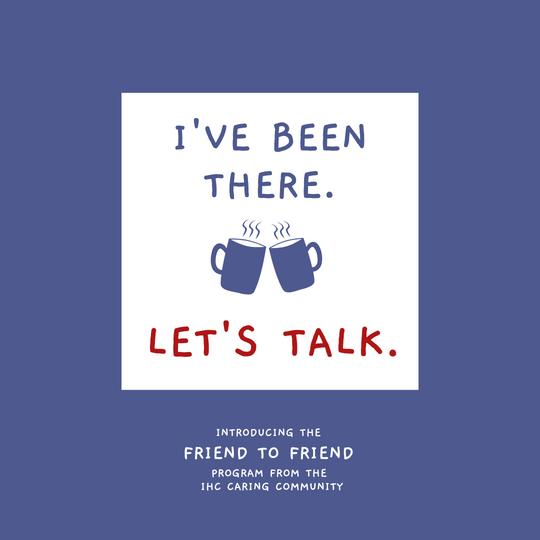
March 1
Emanuel Arffa
Barbara Bailie
Pearl Blum
Eva Borinstein
Babette Breisacher
Jacqueline Efroymson
Joseph Flummerfelt
Norma Funkhouser
Sadie Halpern
Helen Kaplan
Irving Kleinman
Norton Lazarus
Amelia Lewis
Jeanette May
Dave Miller
Leon Oancea
Harold Platt
Herbert Schiller
Alice Weisberger
Sidney Weisberger
Marjorie Wolman
March 2
James Ackerman
Menne Fruehman
Sigmund Guggenheim
Robert Healey
Fred Sanders
Norman Vogel
March 3
Jerry Aronstam
Sylvia Block
Pauline Broock
Gettie Cohen
Sondra Fogle
Lex Haimson
Mary Hurwitz
Belle Jaffe
Eugene Loeb
Herbert Lowenstein
Samuel Rose
March 4
Freda Dumes
March 5
Harriet Asher
Jack Dansker
Charles Feibleman
Cele Goldstein
Robert Klein
Joseph Kramer
Nathan Lipkin
Anna Nelson
Henry Stein
Ellen Wormser
March 6
Anne Drevno
Abraham Kubersky
Herman Logan
Benjamin Popp
Ida Stine
Adele Weil
March 7
Larry Berns
William Borman
Irene Breisacher
Irving Freeman
Luther Gaskin
Samuel Geller
Ludwig Katz
Jacob Liebman
David Lurie
Bert Roth
March 8
Mildred Blumberg
Jeffrey Cowan
Jacqueline Kirsh
Leah Kroot
Rick McCann
Nathaniel Provisor
Irene Schwartz
Bernard Sirota
March 9
Elyse Adams
Rose Alt
Abraham Cohen
Morris Kay
Lena Koby
Julius Michael
Fay Micon
Ida Oakley
Edwin Roger
Meyer Staff
Endre Stern
Hannah Usherenko
March 10
Esther Belle
Lisa Boyer
Rose Csillag
David Dansker
Meyer Efroymson
Le Mar Goodman
Morris Karmen
Jordan Leibman
Annabelle Miller
Rose Moskovitz
Louis Rumple
William Schnur
Sylvia Spiegal
Gerald Tasch
Oscar Tavel
March 11
Nathan Bartfield
Donald Brightman
Donald Craig
Harold Effron
Miriam Gellman
Georgene Glazer
Grace Hellman
Ronald Popp
Louis Rosenberg
Irvin Spasser
Sanford Wieder
March 12
Rebecca Batt
Philip Fichman
Faye Josephson
Max Lorber
Seymour Monat
Eugene Moskovitz
Beverly Peale
Allan Segal
Ida Skwire
Rosa Suriel
Adolph Teixler
Esther Tobin
March 13
Mary Berry
Harris Block
Harry Brodey
Maybelle Cohen
Ann Frisch
Marcia Klapper
Libby Penn
Sillik Polayes
Robert Sklan
Annette Wides
March 14
Warren Ackerman
Melvin Atlass
Vera Card
Evelyn Claymon
Dena Cohen
Gordon Cohn
Raymond Heffron
Jenny Kenis
Rudolph Klapper
Adeline Pactor
Todd Pearson
Lila Perlstein
Lillian Yolles
March 15
Stephen Backer
Rachel Domont
Nancy Feldman
David Hamburger
Rose Herman
Ruth Moss
Steven Romer
Rosa Rosenberg
Dorothy Schulman
Wilhelm Stern
Leaya Yampolskeye
March 16
Rose Ancel
Louis Arkush
Herbert Backer
Grace Christensen
Marvin Gold
Sylvia Herman
Adolf Kerber
Lillian Kubersky
Myer Lazarus
Ruth Lieberman
William Medias
Norma Moss
Walton Sicanoff
March 17
Charles Breeden
Millie Cohen
Yevgeny Dolgin
Helen Goldman
Dean Gossett
Harry Olshewitz
Ben Ratner
Irvin Rheins
Aaron Rubin
Thelma Sands
Marion Shaw
Burton Signer
Julian Weil
March 18
Rose Ancel
Morton Gellman
Lillian Goldstein
Ben Koby
Max Litt
Donna Lucas
Jacqueline Phillips
Louis Trockman
Anna Wolf
Martin Yale
March 19
Sarah Eskenazi
Bessie Leopold
Marilyn Roger
Stanley Shapiro
Serene Wittles
March 20
Meyer Efroymson
Frieda Eichenberg
Adolf Kerber
Alvin Lerman
Lazar Levy
Robert McCann
Shirley Morgan
Max Schwartz
Ida Stiefler
Louis Stillerman
Emanuel Ungar
George Wise
March 21
Leon Fisch
Abe Grossman
Sadie Mann
Sol Shmookler
George Ungar
March 22
Sam Apter
Sol Basan
Jeanne Booth
Inez Herz
Elsie Karsch
Joseph Klein
Zelma Mintz
Shirley Mossler
Philip Perlstein
Benjamin Provisor
Rudolph Selig
Anita Silver
Pearl Suskin
March 23
Albert Alliss
John Borinstein
Hattie Breman
Jerry Epstein
Lawrence Feldman
Jeanette Fisch
Ruth Fisch
Marilyn Glick
Joan Kahn
Charles Poppe
Mae Smith
March 24
Frances Abels
Earl Bradford
Esther Eisenberg
Irina Dolgina
Rabbi Jacob Feuerlicht
Annette Kalishman
Fred Levin
Rose Levinsohn
Phyllis Singer
David Smith
March 25
Bayne Benjamin
Dorothy Gorshel
Jeanette Greenberger
Nadine Haury
Marge Jacobs
Harvey Katz
Harry Kushnarov
Alan Lieberman
Rollin Parker
Barry Ressler
Ellyn Signer
Aaron Wilkes
Abe Winter
Jeffrey Yolles
March 26
Molly Cohen
David Epstein
Sandy Frey
Rose Goldberg
Helen Himelstein
Joyce Koehler
Dora Loganofsky
Ann Lowenkron
Michel Mirowski
Aaron Rabb
Max Seidman
Sherman Weinstein
Ida Weinstock
Marjorie Wolman
Betty Yosha
March 27
Adel Bank
Al Braun
Harry Glanzman
Francis Hackett
Hannah Julian
Florence Kouts
Abe Levenstein
Edward Pearlman
Robert Pickrell
Evelyn Sabetay
Sherman Weinstein
March 29
Harry Eisenstein
Mary Fink
Morris Goodman
Nathan Kort
Pearl Refkin
Louis Rothchild
Eva Selig
Max Strashun
Jeanne Stuckgold
March 30
Florence Cooper
Frances Edenberg
Arnold Feinberg
Robert Finn
Harold Kaplan
Marilyn Karsch
Edith Kopfstein
Louis Leitz
Eli Lieberman
Stanley Weiss
Tekla Wolf
March 31
John Adams
Allan Arkush
Morris Arnow
Walter Blumenthal
Jack Breskow
Greta Cahn
Delmas Cromer
Joseph Fox
Elaine Halberstadt
Dolly Herman
Frank Hoffman
Edward Karsch
Henry Marks
Anna Medias
Marilyn Roth
Louis Talesnick
Isaac Zurkovsky
ADULT EDUCATION FUNDS
BRAUNSTEIN/BELLE ADULT EDUCATION
Memory of Marion Garmel
Anita Dansker
Memory of Emil Dansker
Anita Dansker
YOUTH PROJECTS FUNDS
MAX STRASHUN TEMPLE TOTS
Memory of Mildred Dansker
Anita Dansker
LIBRARY & ARCHIVES FUND
JOSEPH CANTOR LIBRARY
Honor of Evelyn Pockrass
Jewish Learning Program
LIBRARY BIRTHDAY BOOK CLUB
Honor of Noah Steingold
Lisa Brown & Mark Steingold
IHC FOUNDATION FUNDS
FOUNDATION GENERAL FUND
Antonio Paolo Zavattini
DISCRETIONARY FUNDS
SENIOR RABBI’S DISCRETIONARY
Charlie & Jane Butcher
Batya Nechama
Honor of the Clergy Team
Marcy & Ethan Pattinger
Honor of Rabbi Brett Krichiver
Anonymous
Memory of S. Leon Lapidus
Douglas J Lapidus
Memory of Gladys & Nathan
Niesenbaum
Becca, Lily & Eric Nisenbaum
Memory of Agnes L. Korthy
Andrea Burnett
Memory of Ina Feldman
Laura & Michael Iosue
ASSOCIATE RABBI’S DISCRETIONARY
Honor of the Clergy Team
Marcy & Ethan Pattinger
CANTOR’S DISCRETIONARY
Honor of the Clergy Team
Marcy & Ethan Pattinger
Memory of Paul Csillag & Leon Engel
Andrew & Irene Engel
RABBI/DIRECTOR OF LIFELONG LEARNING DISCRETIONARY
Honor of the Clergy Team
Marcy & Ethan Pattinger
TEMPLE GENERAL FUNDS
TEMPLE GENERAL FUND
Anonymous
Sarah Butler
Nancy Joseph
Matthew Kleiman
Katie Leitch
Honor of Simon & Adriane
Efroymson
Anonymous
Honor of Sam Lloyd
Diane Lutz
ELAINE AND GERRY ARFFA STAFF APPRECIATION FUND
Beth Huffman
HIGH HOLY DAY APPEAL
Rachetta & Lawrence Kaseff
Sarah Butler
THE CANTOR JANICE L. ROGER MUSIC AND CULTURAL ARTS FUND
Susan Dluz & Ken Gould
Betsy & Jim Backe
OUTDOOR BEAUTIFICATION/HARVEY GADDIE FUND
Memory of Anna Dansker
Anita Dansker
YAHRZEIT MEMORIAL FUND

Memory of Robert Wolen
Marion Wolen
CEMETERY FUND
Jed & Miranda Mandel
Memory of John Anderson
Ruth Anderson
Memory of Louise Sirkus
Liz & Brad Cohen
Memory of Barnett Roseff
Hilly Roseff
SOCIAL JUSTICE
CHEVRAT CHESED – CARING COMMUNITY
Anonymous
INTERFAITH HOSPITALITY PROJECT/NETWORK (FAMILY PROMISE)
Memory of Gay Kahle
Phyllis Ackerman
IHC Circles are small groups formed around interests, geography, life stage, or profession. Our current Circles include....
EUCHRE
GA'AVAH (PRIDE)
GLOBAL DINING EXPLORERS
IT'S WINE O'CLOCK SOMEWHERE
MAHJONGG MAVENS
MENTAL HEALTH PROFESSIONALS
NEWISH TO JEWISH
TAKE A HIKE... TOGETHER
YOUNG COUPLES
YOUNG FAMILY ADVENTURES
And there are even MORE Circles coming together that cater to your passions and interests.
Stay up-to-date on all things IHC Circles at ihcindy.org/ihc-circles/ OR join the IHC Circles group on Facebook!
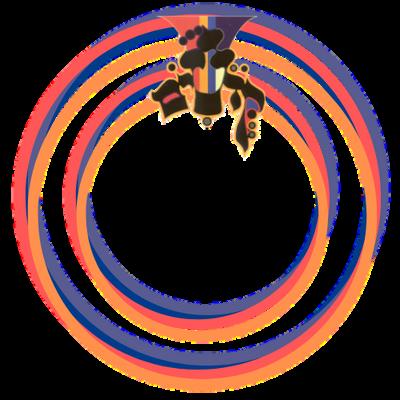

IHC Front Office
ECC Office
Our Website Facebook Instagram
317-255-6647
317-254-2186
www.ihcindy.org
www.facebook.com/IhcIndy
@ihc.indy
All services, unless otherwise noted, can be viewed live on IHC website.
Kabbalat Shabbat service
Fridays at 6:15pm
Nefesh Shabbat Service
Every third Friday at 6:15pm
Shabbat Morning Service
Saturdays at 10:30am
Join us for Oneg Shabbat following our Friday evening services.
It is a mitzvah to sponsor an Oneg Shabbat, whether it is for a special occasion (b'nai mitzvah/baby naming/anniversary) or just because you want to step up to help! You can host alone, as a family, or get a group together to co-host
Take your Purim celebration up a notch with items from the Sisterhood Gift Shop.
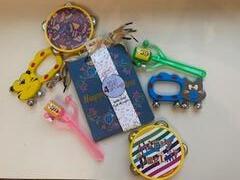
Come visit us: Tuesday-Friday 10:00am-2:00pm Friday evening 5:15-6:15pm Sundays 9:30am-12:00pm
(when Jewish Learning Program is in session)
Interested in volunteering or need a special appointment? Email ihcsisterhoodgiftshop1@gmail.com
Torah Talk
Select Wednesdays at 9:30am
Join Rabbi Krichiver to discuss Jewish sacred source texts in a non-intimidating way. Unless otherwise noted, you can attend in person or online. Proudly presented by Sisterhood. You can find the Zoom link to participate on ihcindy.org/online
Shabbat Morning Torah Study
Saturdays at 9:00am
Led by IHC clergy, the group is guided through the weekly Torah portion text seeking understanding of the teaching for the time and discussing its message for today. Unless otherwise noted, you can attend in person or online. No prior knowledge is necessary and all are welcome. You can find the Zoom link to participate on ihcindy.org/online
The next issue of Kulanu will be available digitally at the end of April. You will be able to access that issue and access all past issues online at ihcindy.org/kulanu-archive/
The next printed issue of Kulanu will be mailed out at the end of May.